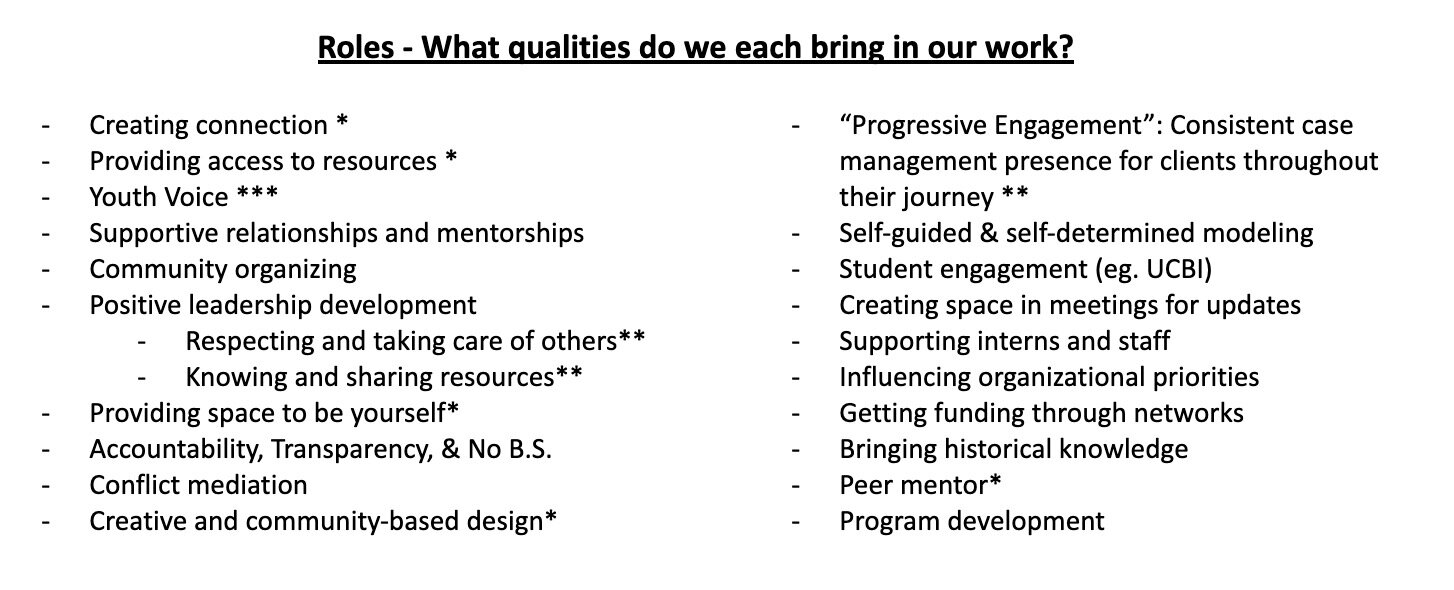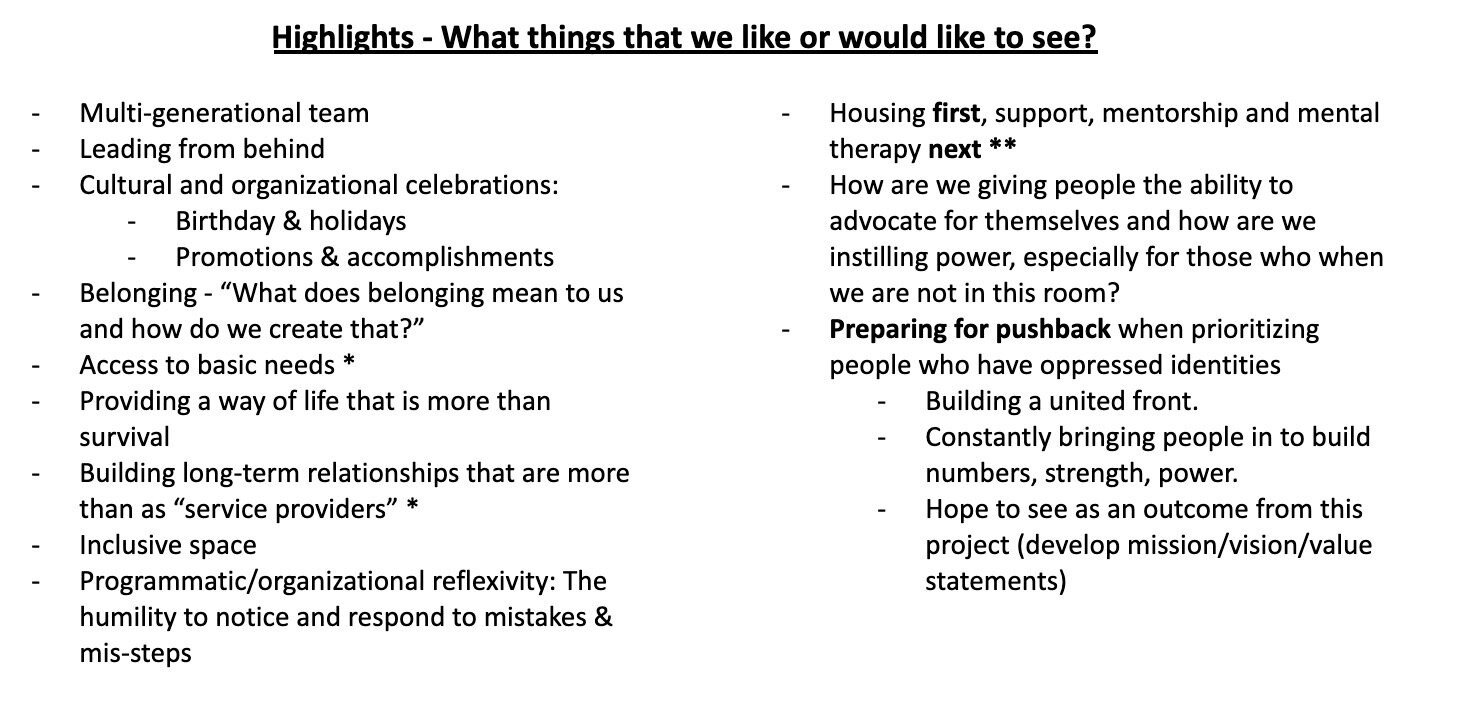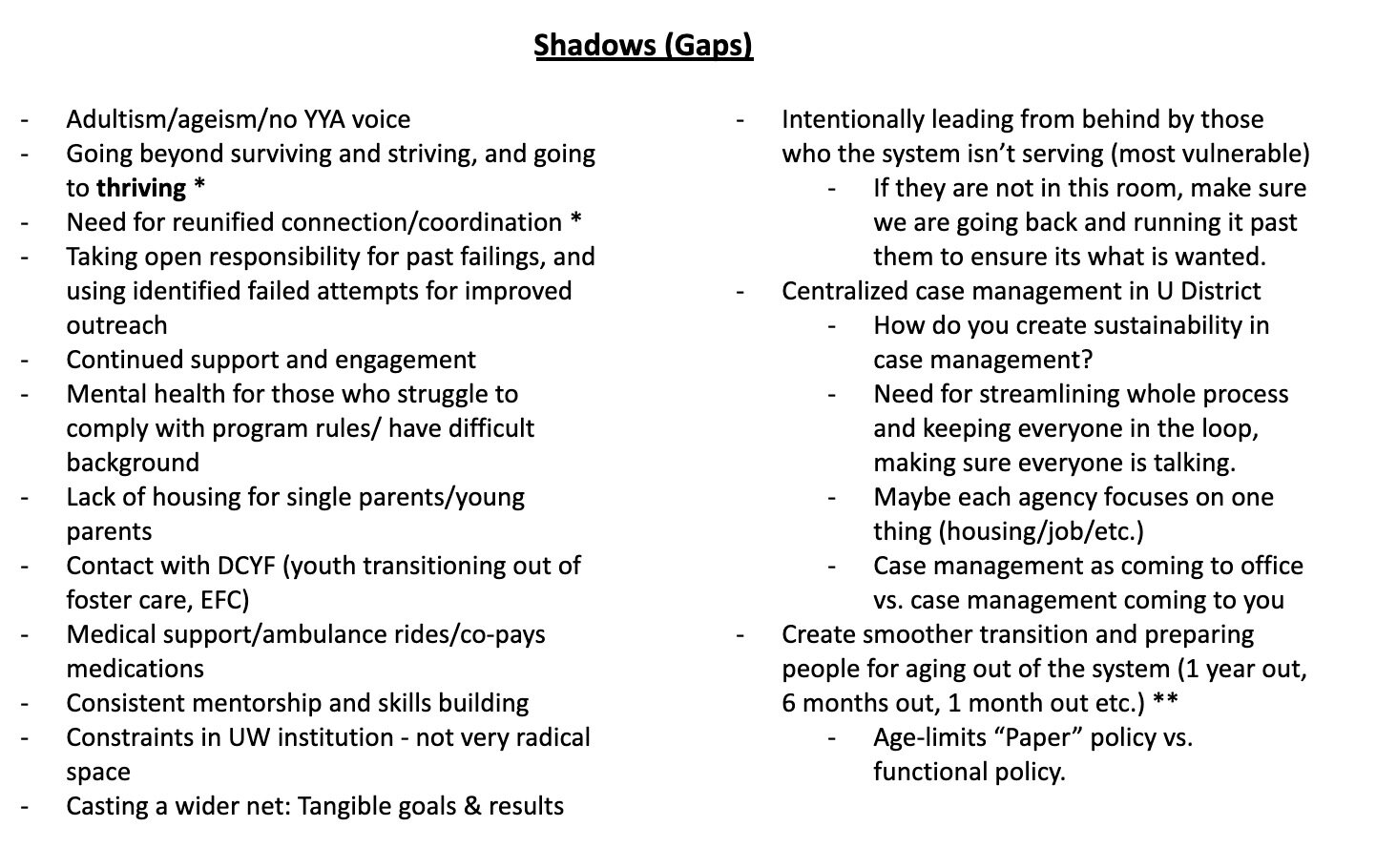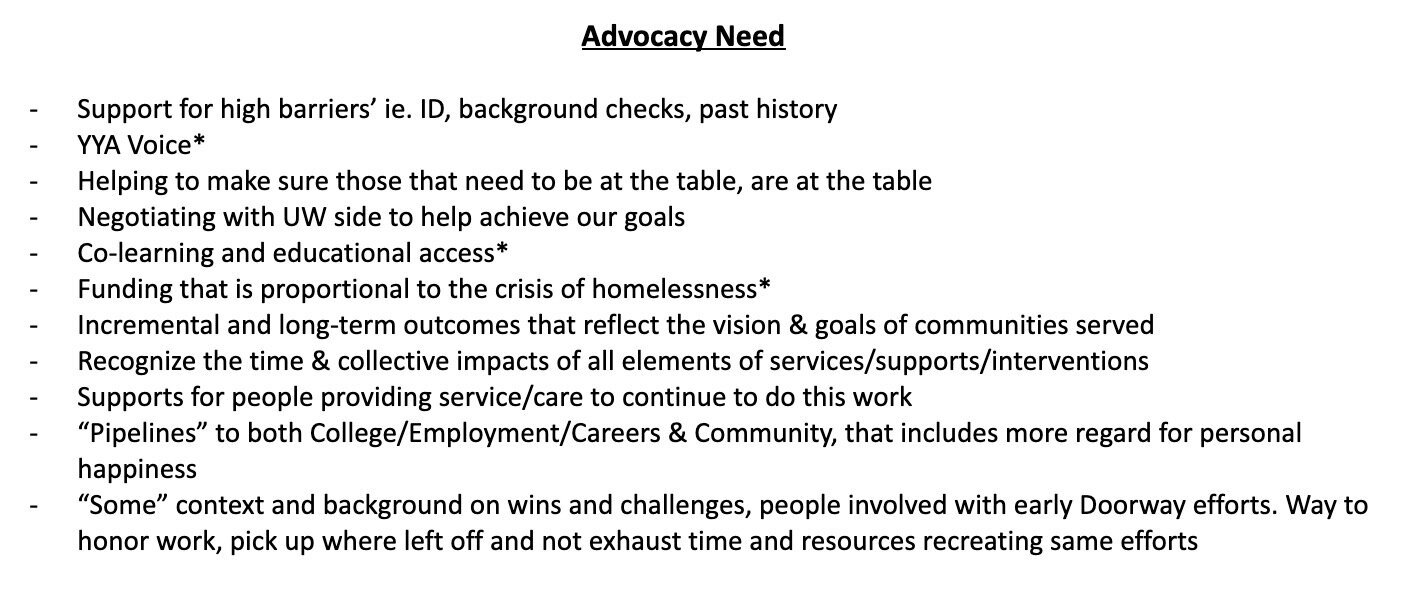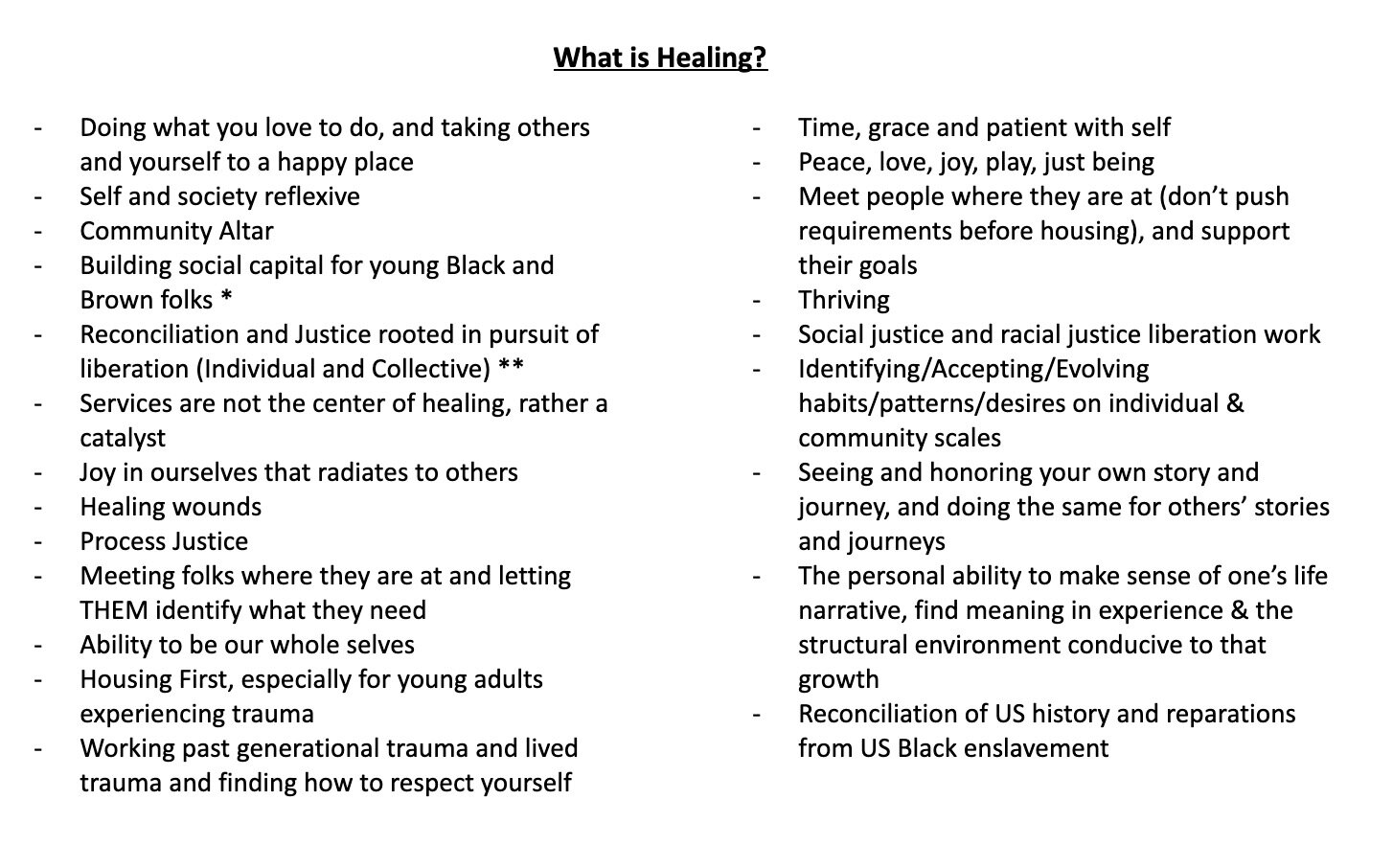Community Advisory Board: Building the Project from the Ground Up
+ What is the Community Advisory Board (CAB)?
- The CAB is a group made up of UW representatives, YouthCare management, staff, young adults with lived experience of homelessness, and other community service providers and advocates who serve this population.
- The CAB will help guide and develop the Doorway model based on best practices and input from the community, ensuring that voices of youth and young adults experiencing homelessness in the U District are centered throughout every step of the process.
+ Why have one?
- Various members of the community in the U District can have a voice in the design process and in program and service development for youth and young adults experiencing homelessness.
+ What will we do?
- The Community Advisory Board (CAB):
- Meets monthly (1st Friday of the month) for two hours
- Collectively develops Doorway Project’s vision and mission
- Reviews pre-existing data from one-on-one interviews and focus group meetings with youth and young adults using services in the U District.
- Works together to guide future development of programs and services.
+ Who can be involved?
- The CAB is made up of individuals from the University of Washington, YouthCare, other U District service providers, and youth and young adults with lived experience of homelessness.
- Youth and young adult CAB members with lived experience will receive a monthly honorarium from the University of Washington and YouthCare for participating in the two-hour Doorway Project CAB meetings and related activities.
+ What are some keys to success?
- Respect for the U District and UDYC community and all its respective cultures
- Patience and persistence.
+ SHARED VALUES
- ‘Ferocious Humility’ in centering others and their experiences
- Making sure everyone’s voice is heard and respected
- Creating a Safe Comfortable and Brave Space
- Step Up, Step Back
- Showing Up
- Come as you are, Go as you are
- Honoring Native presence and wisdom & raising current Native youth struggles in our work
- Critical self-reflection
- Everyone has knowledge and wisdom & shows up differently
- Acknowledging your own power and privilege
- Recognizing intent vs. impact & being open to feedback (“Ouch & Oops”)
- Assuming best intentions
What is Healing?
As a group, we asked ourselves “What is Healing?” Here are a few key words that came up in our discussion around healing as individuals and as a community.
Healing-Centered Manifesto
The Doorway Project’s 4 Frames of Healing-Centered Service.
Healing Focused Engagement
Healing Centered Training
Co-learning
Connection between agencies
A Healing-Centered Service Radiates Joy.
We are able to gift ourselves time, grace, and patience. From this, we gain clarity toward taking full reign in exploring whatever it is that we love to do. Supportive relationships and mentors encourage us to find our own happy place; a light lit within, tacitly lighting the flames of others- igniting them to exist authentically & be. We collaborate intentionally amid a multi-generational team where youth & young adult voices are key. We are committed to the long-term journey of progress, holding ourselves and each other with accountability. We communicate transparently, as knowledge and access to resource is central to achieving upward mobility. As a community we thrive upon these interdependent connections, rooted within infinite perspectives and history.
A Healing-Centered Service Bridges Historical Knowledge.
We rely upon creative leadership development in order to sustain programming that invests in individuals holistically. Trusting ourselves to be self-guided, we meet folks where they are at and let them identify what they need. We enable the reclamation and honoring of one’s own story and journey. We are empowered with the personal ability to make sense of our own life narrative and find meaning in these experiences. Thus, we assert and advocate for environmental structure that is conducive to our growth- contradicting the ongoing process of colonization. We name the systems of oppression that have impeded much of our society from understanding humane potential for generations. We notice and respond to mistakes & mis-steps with humility as we dismantle these systems within ourselves. In solidarity with the many intersecting identities we bear, we know that healing ensues when we consciously validate each other’s sense of belonging.
A Healing-Centered Service is a Pillar of Social Capital.
We are in pursuit of individual and collective liberation. We respect the services we represent as catalysts for the justice and reconciliation that we seek. We lean upon the power of our community network with innovation, activism, and shared funding. We influence organizational priorities from the most vulnerable circumstance, encompassing those who we may not often see. We stand firmly in opposition to pushback when prioritizing those who are most impacted by marginalization. We embody a radical legacy in the wake all who dare to dream.
CAB Meeting Minutes and Handouts
+ November Meeting Minutes
+ December Meeting Minutes
+ January Meeting Minutes
+ February Meeting Minutes
+ April Meeting Minutes
+ May Meeting Minutes
CHALK TALK!
February Chalk Talk Notes
Chalk Talk Slideshow
The following slideshow was created by our team member Tyreesha to help structure the January-June 2020 CAB meetings, and help the group develop a shared vision and attainable project goals. Each slide serves as a jumping-off point for each month’s meeting, and is a rough outline to for the group to fill in, in a rotating gallery-style “chalk talk” written group conversation.
